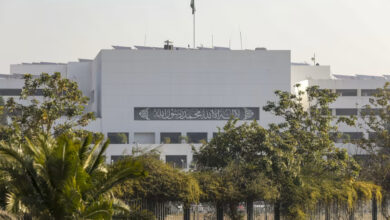Last week’s article about the philosophy of the coming constitution of the modern civil Egyptian state offered many suggestions to the 10-member committee and the subsequent 50-member committee. Naturally, there will not be religious parties of any kind. This does not mean that individuals do not have the right to have their own beliefs and references. It is natural too that there will not be secret groups of closed membership, that have unknown funding sources and are uncontrolled by authorities in terms of rooting out corruption. Democratic countries do not have associations with political and military wings; there are only civil parties that express and mobilize certain segments of society. Policies should not be included in the constitution. It should not be written that Egyptian people are part of the Arab nation and that Egypt works to achieve Arab unity, although this could be an approach for one or a group of parties. Including this in the constitution would not mean anything. It overburdens the state. In a civil democratic country, there should not be any kind of discrimination against workers, farmers, or women, but rather achieving equality and establishing justice among citizens should be the goal of our general policies.
Logic goes like this and applies to other issues that could be sensitive. However, frankly speaking, it is not only time to determine the country’s destiny, but also its future. Those who insisted not to have a roadmap, but rather wanted a “future map,” were right, as all outstanding issues in Egyptian history must be resolved. Issues that were not discussed wisely at the right time and resulted in a series of ongoing failure and hence hampered the country’s progress should also be discussed. The issue of the relation between the state and the military has as much importance as the relation between the state and religion. It has been pushed to the front due to two elements: the heroic role played by the armed forces, which responded to the people’s will in restoring the country to its democratic civil path after the gradual slide toward the Iranian model, and the heroic role played by the wise Lieutenant General abdel Fattah al-Sisi in transferring power from the secretive Muslim Brotherhood group to the Egyptian people once again. Both elements, in addition to mass rallies, have created a historic moment of enthusiasm, passion, and patriotism. We must compare what happened on 30 June, 3 July, and 26 July with what happened on 23 July 1952. Lieutenant General Sisi is not Gamal abdel Nasser, for sure.
I know many people are not nostalgic about the Nasserist era. I do not want to initiate a discussion on a historic period that only history can judge. What is important for us now is not whether the head of state is a civilian who took off his military uniform. What is important is that the armed forces intervened in running the civil state when it had a big influence in ministries, governorships, companies, and public sector institutions. It even had influence on ambassadors of the Foreign Ministry.
There is no doubt that many military figures have succeeded in all fields. However, their involvement in politics had a negative impact on the democratic development of the country. It also had an effect on the management of national security policies, which resulted in Israel’s occupation of Sinai twice, the glorious War of Attrition and the great October War, which established diplomat means for liberating Sinai. An issue of no less importance is that the democratic civil state does not allow for such intervention. Not only does the national army have the duty to defend the country, but it must also express the people’s will at crucial moments in history. It is well-known that the oath taken by US military personnel is based on defending the state against internal and external dangers.
Lieutenant General abdel Fattah al-Sisi is another story that requires scrutiny and prudence at a critical moment of the country’s history. I have had the good fortune of meeting him twice. The first time was among a group of intellectuals, media figures, and actors. The other time was among a group of members of the armed forces. Both times he appeared to have leadership qualities and charisma. In brief, he has the national leadership qualities the country is longing for.
Thus, I do not blame those who call for him to be president, but I call on them to reconsider. What their evidence is based on, using the example of Eisenhower and de Gaulle, amounts to historical inaccuracy and rushed analysis. Historical facts refer to more than this. In history, leadership was granted to warriors such as King Menes, Alexander the Great, Julius Caesar, Salah Eddin al-Ayyubi, and Mohamed Ali. However, the modern civil state that we seek in the future is different. Eisenhower was elected years after he had left the armed forces after the end of World War II. He was a member of a political party. De Gaulle, who was a savior just like Sisi, came to power years after he had left the French armed forces after liberating France. He was engaged in policy through a political party which founded the basics of the Fifth Republic, which the French were satisfied with. In both cases – Eisenhower and de Gaulle – the general was part of civilian political institutions, in which he worked with others for a long time before seeking the presidency.
Once again, the standard is the conditions and circumstances surrounding the modern democratic country. We have experienced six decades during which the idea of a power transition was impossible. Those who revolted against the regime inadvertently transferred power to those who equated power with Islam. This time, we have to make the right choice and take the appropriate steps in order to determine our own future and not repeat the past.




